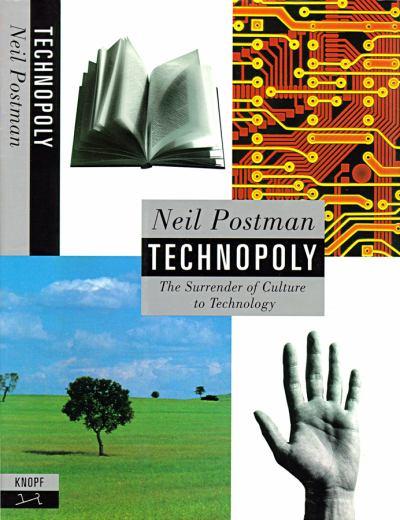The 7 Questions For Any Technological Idea
From Neil Postman’s lecture On Culture’s Surrender to Technology:
- What is the problem that this new technology solves?
- Whose problem is it?
- What new problems do we create by solving this problem?
- Which people and institutions will be most impacted by a technological solution?
- What changes in language occur as the result of technological change?
- Which shifts in economic and political power might result when this technology is adopted?
- What alternative (and unintended) uses might be made of this technology?
The lecture these questions come from is based largely on the excellent book, Technopoly: the Surrender of Culture to Technology.


Whose problem is it
Fixed. Thanks.
I think an excellent self-discipline, no matter how “exciting, new, improved, on-a-bandwagon” a technology or something is, is to ask “what is the downside?” Or, to be diplomatic, “If there was a downside, what might it be?” Even things as marvellous as television and social media have a downside. Same with new legislation. And business decisions.
It frustrates me when people are too excited to think.
I go, “Why do we want to do this X?”
“Because it’s X!”
“Well, why?”
“Because it’s X!”
And then I realize that I can’t talk about it at this time…
Coincidently, my current weekly blog-essay is called Woe is Social Media, where I reference and link two men who quit media cold turkey.
There are many unattended consequences when new technology is adopted. The list of seven questions is thought provoking when looking at both new and existing technologies. For instance, if Facebook wanted to they can impact the elections of many countries including the US. They can provide reminders to “some” users to go vote on election day while not remind others based on their politics.
Let’s walk through a use case for user data. One area that I’m struggling to understand the long term impact is the manipulation of user data. Advertisers for many decades have been collecting data on their users. But, that data was fragmented and isolated. With companies such as Google and Facebook aggregating all of that data, there will be two outcomes. Accurate and better ads or manipulation of that data for other purposes.
There is a balancing act with legal/compliance and innovation when using user data. Unfortunately, I see most companies making things up as they go along because the regulators don’t know what to do with new products especially around user data.
There is an opaque marketplace for buying and selling user data. Whenever the marketplace is opaque, watch out!
Or you could simply add 5 W’s and 1 H.
What is the technology?
Why is it necessary?
When will it come into effect?
How is it going to affect people? and so on.
That’s a good list Scott.
I have a more granular set of questions I ask when working with medical device companies: http://www.ericshaver.com/10-questions-ask-medical-device-development-lifecycle/
But, I do appreciate the higher level, thought provoking questions posed by Neil.
Thanks for this link. Interesting. Postman’s list is obviously more culturally oriented, and yours is more product oriented.
From your list, my favorites might have been:
As they reflect a big distinction in how to think about what good design is.
Dear Scott, I’d like to thank You for inspiring Me …
Hi Scott thanks for the thought provoking questions. Just got the book! Excited to start reading it. Thanks for the awesome reading :)
It’s great to see these questions asked because I never really stopped to think of what exactly the effects of technology are when faced with problems. Look forward to reading the book!
Interestingly, I have noted that while these questions appear in the Neil POstman lecture, they do NOT appear in the book Technopoly in this collective fashion